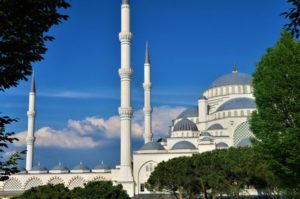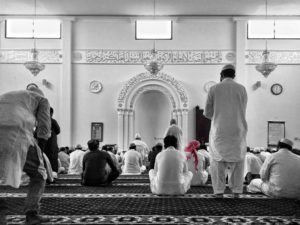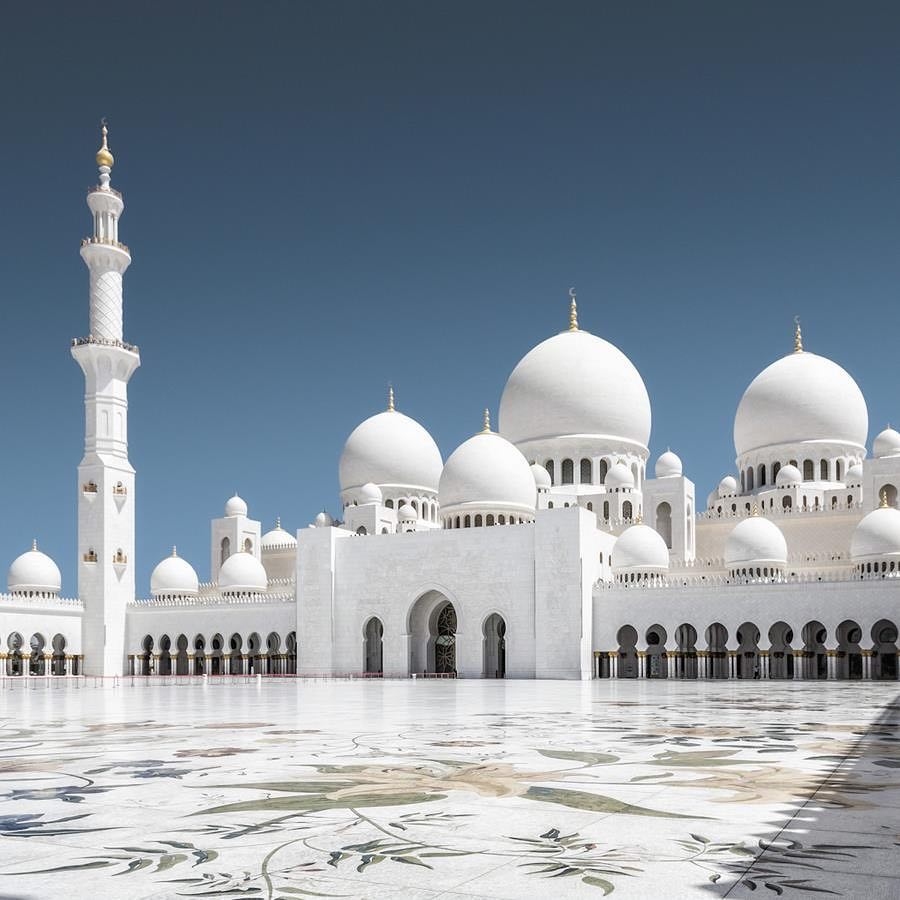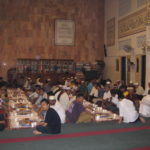A mosque is the center of religious observance for the Muslims. The word mosque literally means a place of prayer or worship. In Arabic, it is called masjid. This word is derived from root “sajd,” which means the place where one prostrates oneself by placing the forehead on the floor in a supreme act of submission and surrender before Allah.
Historically, the need for a special place for prayers was felt very early in Islam. After migration to Medina from the city of Makkah, the Muslims built the Prophet’s Mosque or Masjid-e-Nabwi in AD 622. This was a place where Muslims assembled for their daily prayers. The mosque became the center of worship as well as a place for political, religious and social gatherings. Prophet Muhammad (peace be upon him) used to receive Christian delegations within the precincts of the mosque. It was also a place where the teachings of Islam and Qur’an were imparted to the early Muslims.
Mosques play a very pivotal role in the lives of the followers of Islam
Following the traditions of Prophet Muhammad (peace be upon him), a mosque can be used as a place to offer prayers, as an educational institute, a place for dawah (call to Islam) activities and a place of social gatherings. However, it is forbidden to engage in business or trade activities within the mosque.
 Just like the past, today the Muslims of a community assemble in their local mosque five times a day to offer their prayers. These congregational prayers are strong examples of Muslim unity and faith. Behind one imam, they prostrate themselves in a unique symbol of piety and humility before their Creator regardless of their race, color, social and economic status. By standing shoulder to shoulder before Allah in the mosque, they all become equal.
Just like the past, today the Muslims of a community assemble in their local mosque five times a day to offer their prayers. These congregational prayers are strong examples of Muslim unity and faith. Behind one imam, they prostrate themselves in a unique symbol of piety and humility before their Creator regardless of their race, color, social and economic status. By standing shoulder to shoulder before Allah in the mosque, they all become equal.
By gathering every day in the mosque, Muslims come to know about the problems of their neighbors and community at large. This fosters a sense of brotherhood and communal goodwill which lays the foundation of a strong, vibrant community. Many mosques all over the world conduct nikkah (marriage) ceremonies offer welfare advice, family guidance, counseling, funeral services and humanitarian aid to their patrons.
Many major mosques also serve as educational institutes, imparting religious knowledge to the young and old alike. People can come here to memorize the Qur’an and learn about the fiqh and hadith (Islamic jurisprudence). Arabic lessons are also conducted so that Muslims can read and understand the Qur’an in its original language.
Friday sermons
Friday sermons are a regular feature in every mosque. The prayer leader chooses a subject to exhort the congregation to shun bad practices and enjoins them to do good deeds. They are a means to revitalize faith and knowledge of the religion, which helps the Muslims to purify their souls and do good deeds, which in turn benefits the community at large.
 People from all walks of life come to mosques to learn about Islam and embrace religion. The mosque then arranges for financial assistance and guidance for the new converts. Seminars and lectures can also be conducted in mosques to enhance the knowledge of Islam among Muslims.
People from all walks of life come to mosques to learn about Islam and embrace religion. The mosque then arranges for financial assistance and guidance for the new converts. Seminars and lectures can also be conducted in mosques to enhance the knowledge of Islam among Muslims.
Mosques form the center of Muslim communities; hence many people prefer to donate their money to mosques for distribution among those who deserve it. In times of natural calamities, mosque administrations usually play a big role in collecting sadaqat (charity in the form of money and goods) and dispersing it among the needy.
Some mosques also arrange for free meals for the hungry and destitute, hence helping to take care of the impoverished class of society. During the holy month of Ramadan, people living in nearby places provide food for the iftar meal, when the fast is broken and everybody eats a free meal together. Hence no one within the community goes hungry.
The role of mosques for a Muslim community
The role of mosques for a Muslim community becomes even more pronounced in countries where Muslims are in a minority. Attendance in a mosque usually keeps the Muslims informed about the issues or problems facing the Muslim community.
Hence, mosques play a vital role in the spiritual, moral and social improvement of any Muslim community. The onus is on mosque committees, the imams and the local Muslim residents to ensure that the mosques are always a true reflection of Islamic teachings and promote peace, harmony and goodwill among the people.






